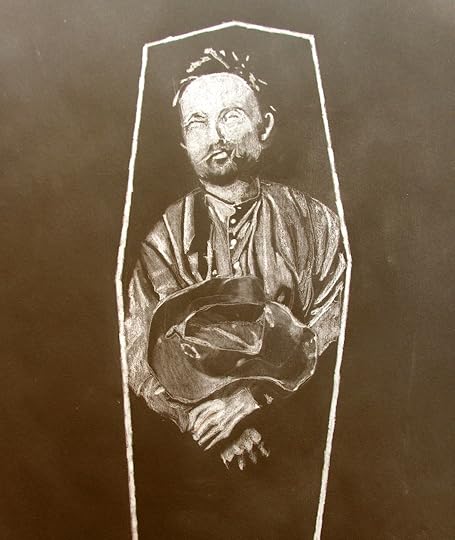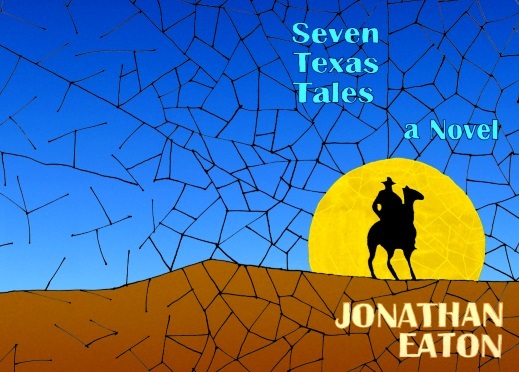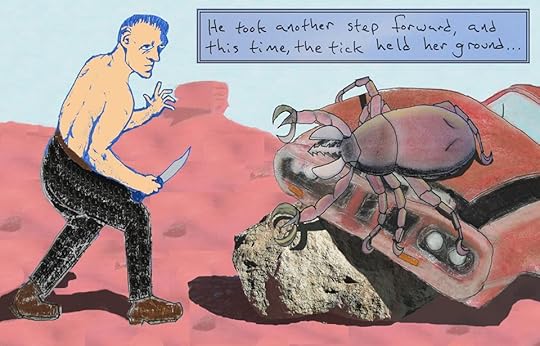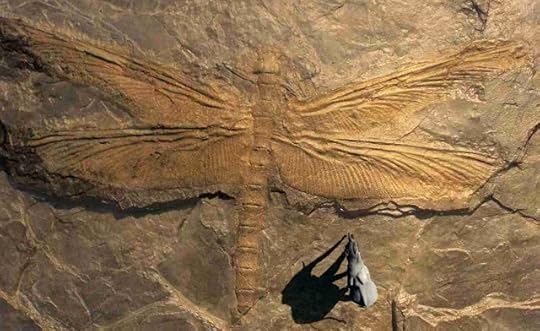Jonathan Eaton's Blog, page 2
May 5, 2019
12 Ways to Die in the Wild West
I've been reading 1860's and 1870's editions of Dallas Newspapers, and I have a pretty good idea of some of the surest ways to meet your maker in the "Wild West." So if you are putting the finishing touches on your time machine, and are planning a vacation on the Texas frontier, take note:
1) Step on another man's toes while dancing at a "ball". I assume this does not mean you are dancing with another man, but the papers are never really clear on the subject. Generally, the paper simply quotes the killer as saying something like "He stepped on my toes while I was dancing so I killed him".
2) Ride in a horse-drawn carriage.
3) Work in a tannery. Apparently there were machines in a tannery that, if you weren't careful, would drag you in and turn you into guacamole.
4) Be an actor or actress, or I suppose any job requiring travel. Trains fell through bridges. Steamboat boilers exploded. Theaters and Hotels caught on fire.
5) Accuse a man of stealing a melon.
6) If you called a man a liar, you might live another day, if he wasn't in a particularly bad mood. But if he called you a liar, and you shot back with the clever retort of the day: "Oh, yeah? Well you're a damn liar!" then one of you would be sleeping six feet under ground in the very near future.
7) I mentioned steamboats above. But just to be perfectly clear, on your time-travel vacation, skip the steamboat ride (dyspepsia is always a good excuse). The most horrific deaths I read about were steamboat accidents, particularly boiler explosions. You'd be paddling up or down the Big Muddy and next thing you know you're in the river with your skin steamed off. If you were lucky, you drowned, because you were going to die anyway and it would be four or five hours before the doctors showed up with the morphine.
8) Be flammable. Everything caught fire all the time, and despite that fact, not much thought was given to how people might get out of a building (or off a boat, or train) that was on fire.
9) Get bit by a dog. Lots of rabies back in the day. Interestingly, there were rabies deniers in America in the 19th century. Because it often took months after a dog bite for the victim to show symptoms, there were those who believed the dog-bite/rabies connection was a figment of people's imaginations. One physician even recommended post-dog-bite "lectures" as a cure for rabies. If you could convince your loved one that rabies didn't exist, they wouldn't get it.
10) Be black.
11) Be Native American.
12) Get drunk. Life was dangerous in Texas in the 19th century, and to survive, you had to be on your game. Get drunk and you might slip up and step on another man's toes while dancing, accuse someone of stealing a melon, get on a steamboat or pet a strange dog.

1) Step on another man's toes while dancing at a "ball". I assume this does not mean you are dancing with another man, but the papers are never really clear on the subject. Generally, the paper simply quotes the killer as saying something like "He stepped on my toes while I was dancing so I killed him".
2) Ride in a horse-drawn carriage.
3) Work in a tannery. Apparently there were machines in a tannery that, if you weren't careful, would drag you in and turn you into guacamole.
4) Be an actor or actress, or I suppose any job requiring travel. Trains fell through bridges. Steamboat boilers exploded. Theaters and Hotels caught on fire.
5) Accuse a man of stealing a melon.
6) If you called a man a liar, you might live another day, if he wasn't in a particularly bad mood. But if he called you a liar, and you shot back with the clever retort of the day: "Oh, yeah? Well you're a damn liar!" then one of you would be sleeping six feet under ground in the very near future.
7) I mentioned steamboats above. But just to be perfectly clear, on your time-travel vacation, skip the steamboat ride (dyspepsia is always a good excuse). The most horrific deaths I read about were steamboat accidents, particularly boiler explosions. You'd be paddling up or down the Big Muddy and next thing you know you're in the river with your skin steamed off. If you were lucky, you drowned, because you were going to die anyway and it would be four or five hours before the doctors showed up with the morphine.
8) Be flammable. Everything caught fire all the time, and despite that fact, not much thought was given to how people might get out of a building (or off a boat, or train) that was on fire.
9) Get bit by a dog. Lots of rabies back in the day. Interestingly, there were rabies deniers in America in the 19th century. Because it often took months after a dog bite for the victim to show symptoms, there were those who believed the dog-bite/rabies connection was a figment of people's imaginations. One physician even recommended post-dog-bite "lectures" as a cure for rabies. If you could convince your loved one that rabies didn't exist, they wouldn't get it.
10) Be black.
11) Be Native American.
12) Get drunk. Life was dangerous in Texas in the 19th century, and to survive, you had to be on your game. Get drunk and you might slip up and step on another man's toes while dancing, accuse someone of stealing a melon, get on a steamboat or pet a strange dog.

Published on May 05, 2019 09:54
•
Tags:
danger, death, texas-frontier, wild-west
March 22, 2019
A Few of my Favorite Things
10 of my favorite things about writing, in no particular order:
1) Creating a whole person, community, world, or even universe, out of nothing.
2) Being able to spend hours or days coming up with the perfect snappy comeback.
3) Connecting with other writers and people who love books.
4) Getting a review where it's clear the reader got exactly what you were going for.
5) Getting a review where the reader came up with something cool that never even crossed your mind.
6.1) Thinking through/trying on alternative perspectives and life-strategies, through characters who see the world, and react to it, differently than you do.
6.2) Sneakily getting readers to consider alternative perspectives and life-strategies, through characters who see the world, and react to it, differently than they do.
7) Escaping reality for a while.
8) Daydreaming about what Terry Gross is going to ask me on my “Fresh Air” interview.
9) Mulling over which directors and leading actors I'm going to choose for that movie that is definitely going to be made some day.
10) The many opportunities for being silly.

1) Creating a whole person, community, world, or even universe, out of nothing.
2) Being able to spend hours or days coming up with the perfect snappy comeback.
3) Connecting with other writers and people who love books.
4) Getting a review where it's clear the reader got exactly what you were going for.
5) Getting a review where the reader came up with something cool that never even crossed your mind.
6.1) Thinking through/trying on alternative perspectives and life-strategies, through characters who see the world, and react to it, differently than you do.
6.2) Sneakily getting readers to consider alternative perspectives and life-strategies, through characters who see the world, and react to it, differently than they do.
7) Escaping reality for a while.
8) Daydreaming about what Terry Gross is going to ask me on my “Fresh Air” interview.
9) Mulling over which directors and leading actors I'm going to choose for that movie that is definitely going to be made some day.
10) The many opportunities for being silly.

Published on March 22, 2019 01:29
•
Tags:
authors, favorite-things, writing
January 7, 2019
The Dark Forest
I read an interesting article yesterday about “The Dark Forest” theory. I’d never heard of it before. The Dark Forest theory states that the reason we’ve never detected any other technologically advanced lifeforms in our galaxy is because they are all hiding. They hide because any time a technologically advanced lifeform reveals its existence, a more technologically advanced lifeform (let’s call them TALFs) leaps out and gobbles it up.
It seems to me there is one big problem with The Dark Forest theory: Us. We are the only data point we know of, and we’re not making any attempt to hide. Or to put it another way, 100% of the TALFs we know of are making no attempt whatsoever to hide their existence from the rest of the galaxy.
Now, here’s where things get interesting: The question is bound to come up as to whether we should go so far as to broadcast our existence. And the Dark Forest Theory would suggest we shouldn’t. If there are ancient TALFs out there waiting to gobble up emerging TALFs, we’d be done for, and given that possibility, however slight, why take the risk?
Ah, but think about it. Because we are the only datapoint we know of, logic dictates that we must broadcast our existence. The best and only model we have for the behavior of TALFs is our own. If we choose to hide, we must assume other TALFs would make the same choice, and we won’t know what’s out there until we slip up and get gobbled up. But, if we choose to broadcast, we can assume other TALFs would as well, the Dark Forest Theory fails, and the galaxy isn’t such a scary place.
“Be the change you seek”—it’s not just for Earthlings anymore.
It seems to me there is one big problem with The Dark Forest theory: Us. We are the only data point we know of, and we’re not making any attempt to hide. Or to put it another way, 100% of the TALFs we know of are making no attempt whatsoever to hide their existence from the rest of the galaxy.
Now, here’s where things get interesting: The question is bound to come up as to whether we should go so far as to broadcast our existence. And the Dark Forest Theory would suggest we shouldn’t. If there are ancient TALFs out there waiting to gobble up emerging TALFs, we’d be done for, and given that possibility, however slight, why take the risk?
Ah, but think about it. Because we are the only datapoint we know of, logic dictates that we must broadcast our existence. The best and only model we have for the behavior of TALFs is our own. If we choose to hide, we must assume other TALFs would make the same choice, and we won’t know what’s out there until we slip up and get gobbled up. But, if we choose to broadcast, we can assume other TALFs would as well, the Dark Forest Theory fails, and the galaxy isn’t such a scary place.
“Be the change you seek”—it’s not just for Earthlings anymore.
Published on January 07, 2019 10:23
•
Tags:
aliens, dark-forest-theory, first-contact, galaxy, lifeform, space
November 4, 2018
Theme is Bones
Cyndi asked me this morning "So, how does it feel to have finished the novel?"
Strangely (perhaps) finishing a novel feels to me very much like finishing a big project did in my software development days, which I can sum up as follows: "You know, that turned out pretty well, but if I had it to do all over again . . ."
Or to put it another way, writing a novel is always a learning experience for me. So what did I learn this time?
I learned about theme. I came to the conclusion that "theme" is something that is more important to writers than to readers. It gives the writer something to cling to—a way to focus their thoughts about the novel. A theme is a novel's mantra. Without a theme, a novel would just be stuff that happens.
I don't worry too much about plot or characters when I write. If you throw a bunch of interesting people with different objectives and motivations into an interesting and difficult situation, and you let those characters be themselves, they will do interesting things. But without something to hold all those interesting things together, a novel can feel unpleasantly messy, like when you're trying to eat a sandwich with all sorts of great stuff in it but chunks keep falling out of the sandwich into your lap.
Making a sandwich is a form of architecture. So is making a Frankenstein's Monster. So is writing a novel. Theme is buns. Theme is rebar. Theme is bones.
Another thing I learned about theme is that while a theme can hold a novel together as it goes from point A to point B, you still have to have a point A and B. It wasn’t long before I knew this novel was going to get messy. Once I'd figured out the theme, I thought I'd won the battle--I was herding the cats, as it were--but herding cats and getting a herd of cats to a place that really wants a herd of cats are two different things entirely.
That turned out to be the real struggle with this novel, and if I had it to do all over again . . .
Anyway, it's a good novel, and well worth 99¢ for the Kindle version. Read it, and tell me what you think the theme is.
https://www.amazon.com/dp/B07K5J12FV

Strangely (perhaps) finishing a novel feels to me very much like finishing a big project did in my software development days, which I can sum up as follows: "You know, that turned out pretty well, but if I had it to do all over again . . ."
Or to put it another way, writing a novel is always a learning experience for me. So what did I learn this time?
I learned about theme. I came to the conclusion that "theme" is something that is more important to writers than to readers. It gives the writer something to cling to—a way to focus their thoughts about the novel. A theme is a novel's mantra. Without a theme, a novel would just be stuff that happens.
I don't worry too much about plot or characters when I write. If you throw a bunch of interesting people with different objectives and motivations into an interesting and difficult situation, and you let those characters be themselves, they will do interesting things. But without something to hold all those interesting things together, a novel can feel unpleasantly messy, like when you're trying to eat a sandwich with all sorts of great stuff in it but chunks keep falling out of the sandwich into your lap.
Making a sandwich is a form of architecture. So is making a Frankenstein's Monster. So is writing a novel. Theme is buns. Theme is rebar. Theme is bones.
Another thing I learned about theme is that while a theme can hold a novel together as it goes from point A to point B, you still have to have a point A and B. It wasn’t long before I knew this novel was going to get messy. Once I'd figured out the theme, I thought I'd won the battle--I was herding the cats, as it were--but herding cats and getting a herd of cats to a place that really wants a herd of cats are two different things entirely.
That turned out to be the real struggle with this novel, and if I had it to do all over again . . .
Anyway, it's a good novel, and well worth 99¢ for the Kindle version. Read it, and tell me what you think the theme is.
https://www.amazon.com/dp/B07K5J12FV

September 24, 2018
Do Whatever You Want . . . (Except That)
One of the nicest things about indie publishing is you can do whatever you want. One of the un-nicest things is that it’s really hard to get people to buy your book (AKA making money).
But let’s talk about the nice thing, that is, doing whatever you want. It's great.
There are, of course, things an Indie writer should never do, even though they can. Chief among them is doing your own cover.
For my next novel, I’m doing my own cover. It’s not that there aren’t people I wouldn’t love to have do my cover for me (check out
Calef Brown for example—I don’t know if he does book covers, but if I had oodles of money, I’d find out!). It’s that un-nice part about not making any money. A professionally done cover will cost you around $300.00. It might take me six months to make that much from book sales. It might take a whole lot longer—like, you know, how long it will take the sun to use up all its hydrogen and start making that noise a straw makes when you've sucked up all of your malted milkshake (only a lot louder). And don’t tell me where I can get a cover done super-cheap—I’ve seen those covers—you get what you pay for.
I don’t think making your own cover is for everyone. I think it is for me, though. My novels are idiosyncratic. I’m not competing with other techno-thrillers, murder mysteries, space operas, or even westerns. The only reason someone’s going to read my book (aside from some kind of strange and horrible accident, such as being related to me) is that they like my books. My art is also idiosyncratic. So chances are, if you don’t like the kinds of covers I make, you’re not going to like the kinds of book I write. They are both very . . . me.
Here’s the cover I’m working on (and I think I might be finished working on) for my next novel, “Seven Texas Tales — a Novel”

So there . . . and . . . yeah, I like happy colors.
But let’s talk about the nice thing, that is, doing whatever you want. It's great.
There are, of course, things an Indie writer should never do, even though they can. Chief among them is doing your own cover.
For my next novel, I’m doing my own cover. It’s not that there aren’t people I wouldn’t love to have do my cover for me (check out
Calef Brown for example—I don’t know if he does book covers, but if I had oodles of money, I’d find out!). It’s that un-nice part about not making any money. A professionally done cover will cost you around $300.00. It might take me six months to make that much from book sales. It might take a whole lot longer—like, you know, how long it will take the sun to use up all its hydrogen and start making that noise a straw makes when you've sucked up all of your malted milkshake (only a lot louder). And don’t tell me where I can get a cover done super-cheap—I’ve seen those covers—you get what you pay for.
I don’t think making your own cover is for everyone. I think it is for me, though. My novels are idiosyncratic. I’m not competing with other techno-thrillers, murder mysteries, space operas, or even westerns. The only reason someone’s going to read my book (aside from some kind of strange and horrible accident, such as being related to me) is that they like my books. My art is also idiosyncratic. So chances are, if you don’t like the kinds of covers I make, you’re not going to like the kinds of book I write. They are both very . . . me.
Here’s the cover I’m working on (and I think I might be finished working on) for my next novel, “Seven Texas Tales — a Novel”

So there . . . and . . . yeah, I like happy colors.
Published on September 24, 2018 17:21
•
Tags:
art, covers, indie-publishing, novels
August 26, 2018
Mind the Chelicerae
The other day, we were on our way to lunch when my wife asked me if I put a lot of myself in my characters. "That's a good question," I said, and off I went. Fortunately for my wife, our favorite Korean restaurant is only a fifteen minute drive away, and nothing shuts me up quite as quick as a sizzling stoneware pot of bibimbap.
You are not so lucky.
I am a pretty mild-mannered guy. Not a chump or a pushover (I hope), and I can be really, really stubborn, but I am definitely someone who will go to great lengths to avoid unpleasantness. Fictional versions of guys like me don't make great protagonists in a novel, and yet, I felt compelled to create them. The problem was, if I tried to write a character differently, it felt really phony. I would say to myself, "no one is going to believe that person would do that interesting, stress-inducing thing." I felt the constraint, and I hated the constraint, but I didn't know what to do about it.
So the first two novels I wrote were pretty crappy and shall never see the light of day (while I live, anyway). When I started on my third novel "Walther Harp Dreams" I knew I had to do something. So I made the protagonist a lot like me, but I gave him a strange neurosis, a sort of OCD that compels him to complete certain tasks, regardless of the consequences. By the time I was done with the novel (which I consider my first not-terrible novel) I realized that "Kirby” didn’t have to have a neurosis to do what he did, he could just be a guy that did that sort of thing. What to me was a neurosis was, to Kirby, just being Kirby.
That was a real breakthrough for me, and has opened up a whole new world of writing possibilities. Just because I would never venture out into the Scablands to hunt down giant mutated ticks for the purpose of extracting their valuable salivary glands, doesn’t mean Pete Barlow wouldn’t. All I can say is, more power to ya, Pete (and mind the chelicerae!).

You are not so lucky.
I am a pretty mild-mannered guy. Not a chump or a pushover (I hope), and I can be really, really stubborn, but I am definitely someone who will go to great lengths to avoid unpleasantness. Fictional versions of guys like me don't make great protagonists in a novel, and yet, I felt compelled to create them. The problem was, if I tried to write a character differently, it felt really phony. I would say to myself, "no one is going to believe that person would do that interesting, stress-inducing thing." I felt the constraint, and I hated the constraint, but I didn't know what to do about it.
So the first two novels I wrote were pretty crappy and shall never see the light of day (while I live, anyway). When I started on my third novel "Walther Harp Dreams" I knew I had to do something. So I made the protagonist a lot like me, but I gave him a strange neurosis, a sort of OCD that compels him to complete certain tasks, regardless of the consequences. By the time I was done with the novel (which I consider my first not-terrible novel) I realized that "Kirby” didn’t have to have a neurosis to do what he did, he could just be a guy that did that sort of thing. What to me was a neurosis was, to Kirby, just being Kirby.
That was a real breakthrough for me, and has opened up a whole new world of writing possibilities. Just because I would never venture out into the Scablands to hunt down giant mutated ticks for the purpose of extracting their valuable salivary glands, doesn’t mean Pete Barlow wouldn’t. All I can say is, more power to ya, Pete (and mind the chelicerae!).

Published on August 26, 2018 18:30
•
Tags:
characters, novels, ticks, writing
August 18, 2018
David/2
When I start a new novel, I say to myself, “I wonder where this is going?” When I finish a new novel, I say to myself, “So that’s where that was going!” But when I’m about where I am now on this current project (somewhere around the halfway point) I say to myself “Cheese and Crackers writing a novel is a lot of work!”
But is it, really? Is writing a novel “a lot of work?”
To answer this question, I tried think of something that I could feel in my bones was a whole lot of work, then compare that to writing a novel, to get some idea of how much work it really was. What I thought of was carving a credible likeness of a person out of a chunk of marble. No question in my mind that that would be a whole lot of work. A mess-o-work, for sure.
Extensive research (i.e., reading a Wikipedia article) indicated it took Michelangelo about two years to carve his David—two years for Michelangelo to turn one hefty chunk of marble into Dave the Giant Killer. (Dave is seventeen feet tall and weighs north of six tons, btw.) It's true someone had apparently started on a leg before Michelangelo got the job, but if anything, that probably only made things harder for Michelangelo. In my software developer days, I'd sometimes get a project where my boss would say "Alice got started on a leg but then she left for a better job with Mickey D's, so I'm giving this project to you, and you're already a 'leg up' on it! Aren't you lucky?"
Nope. the last thing you want is a project that's a big block of stone with one crappy leg sticking out of it.
Anyway . . . it takes me about a year to write a novel, and I “chip away” (forgive me) at it pretty steadily during that time. I’m not saying I’m a Michelangelo artistic-wise, but I have no reason to think I’m a slouch when compared to him work-ethic wise.
So how much work is it to write a novel? About this much work:

Now you know.
But is it, really? Is writing a novel “a lot of work?”
To answer this question, I tried think of something that I could feel in my bones was a whole lot of work, then compare that to writing a novel, to get some idea of how much work it really was. What I thought of was carving a credible likeness of a person out of a chunk of marble. No question in my mind that that would be a whole lot of work. A mess-o-work, for sure.
Extensive research (i.e., reading a Wikipedia article) indicated it took Michelangelo about two years to carve his David—two years for Michelangelo to turn one hefty chunk of marble into Dave the Giant Killer. (Dave is seventeen feet tall and weighs north of six tons, btw.) It's true someone had apparently started on a leg before Michelangelo got the job, but if anything, that probably only made things harder for Michelangelo. In my software developer days, I'd sometimes get a project where my boss would say "Alice got started on a leg but then she left for a better job with Mickey D's, so I'm giving this project to you, and you're already a 'leg up' on it! Aren't you lucky?"
Nope. the last thing you want is a project that's a big block of stone with one crappy leg sticking out of it.
Anyway . . . it takes me about a year to write a novel, and I “chip away” (forgive me) at it pretty steadily during that time. I’m not saying I’m a Michelangelo artistic-wise, but I have no reason to think I’m a slouch when compared to him work-ethic wise.
So how much work is it to write a novel? About this much work:

Now you know.
Published on August 18, 2018 13:48
•
Tags:
david, michelangelo, novel, work, writing
August 5, 2018
A Horse of a Particular Color
I’m 50K words into my current project, a novel, working title “Seven Texas Tales (a novel).” That puts me at about halfway done, and at the rate I’m going, I should be wrapping up a first rough draft by the end of the year.
For the last couple of weeks, I’ve been struggling with two problems: (1) A scene begging to be written, but with no real significance to the story as a whole, and (2) A plot problem that was resisting all attempts at defenestration. You know where this is going, right? I finally figured out that problem 1 was exactly the trebuchet I needed to rid myself of problem 2.
That’s a good day in novel writing.
Another interesting coincidence: A young man in my novel steals a horse. I decide that he names the horse Moses. Why Moses? I’m not sure—the name just kind of popped into my character’s head. Moses needs a color. I see him in my mind’s eye, but I don’t know enough about horse lingo to know what to call a horse of that color, so I look at a bunch of horses online, and find a “chestnut” horse that looks a whole lot like my Moses. I mean, my character’s Moses.
Next comes trying to describe what it is about Moses that makes my character decide to steal him. Something about the way the morning sun glints off his hide. Glints off his hide like a shiny brass . . . what? So I decide to look at famous things made of brass. What pops up, near, if not at the top of the list? A brass sculpture by Michelangelo . . . of Moses.
So here’s a very quick sketch of a very little bit of that sculpture—sorry man, but I’ve got a novel to write.

Why does bronze Moses have horns? You'll have to ask Mike.
By the way, did I ever tell you, there’s a bunch of free (FREE) short stories and essays by me and my friends available online? You can find them here:
https://coryluspress.com/short-stories/
For the last couple of weeks, I’ve been struggling with two problems: (1) A scene begging to be written, but with no real significance to the story as a whole, and (2) A plot problem that was resisting all attempts at defenestration. You know where this is going, right? I finally figured out that problem 1 was exactly the trebuchet I needed to rid myself of problem 2.
That’s a good day in novel writing.
Another interesting coincidence: A young man in my novel steals a horse. I decide that he names the horse Moses. Why Moses? I’m not sure—the name just kind of popped into my character’s head. Moses needs a color. I see him in my mind’s eye, but I don’t know enough about horse lingo to know what to call a horse of that color, so I look at a bunch of horses online, and find a “chestnut” horse that looks a whole lot like my Moses. I mean, my character’s Moses.
Next comes trying to describe what it is about Moses that makes my character decide to steal him. Something about the way the morning sun glints off his hide. Glints off his hide like a shiny brass . . . what? So I decide to look at famous things made of brass. What pops up, near, if not at the top of the list? A brass sculpture by Michelangelo . . . of Moses.
So here’s a very quick sketch of a very little bit of that sculpture—sorry man, but I’ve got a novel to write.

Why does bronze Moses have horns? You'll have to ask Mike.
By the way, did I ever tell you, there’s a bunch of free (FREE) short stories and essays by me and my friends available online? You can find them here:
https://coryluspress.com/short-stories/
Published on August 05, 2018 18:57
•
Tags:
bronze, horse, michelangelo, writing
July 25, 2018
A Day in the Life of Those Guys
So, is it possible to write a great novel that doesn't have a main character? Asking for a friend.
Published on July 25, 2018 17:35
June 30, 2018
Speaking of Big Bugs
This is what happens in my head when I see a photograph of a "giant, fossilized, prehistoric, dragonfly" and the photographer doesn't bother to include in the photograph something to give you an idea of the actual size.

BTW, "The Prairie Martian" is 99 cents (for the kindle) on Amazon between now and when the aliens come to harvest all of Earth's eReader devices (so you better hurry):
https://www.amazon.com/dp/B01LBXL4L8

BTW, "The Prairie Martian" is 99 cents (for the kindle) on Amazon between now and when the aliens come to harvest all of Earth's eReader devices (so you better hurry):
https://www.amazon.com/dp/B01LBXL4L8



